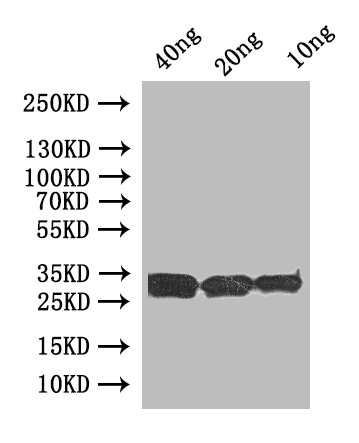uve1 Antibody
-
货号:CSB-PA607455XA01SXV
-
规格:¥880
-
图片:
-
其他:
产品详情
-
产品名称:Rabbit anti-Schizosaccharomyces pombe (strain 972 / ATCC 24843) (Fission yeast) uve1 Antibody Polyclonal antibody
-
Uniprot No.:Q10988
-
基因名:uve1 Antibody
-
别名:UV-damage endonuclease (UVDE) (EC 3.-.-.-) uve1 uvde SPBC19C7.09c
-
宿主:Rabbit
-
反应种属:Schizosaccharomyces pombe (strain 972 / ATCC 24843) (Fission yeast)
-
免疫原:Recombinant Schizosaccharomyces pombe (strain 972 / ATCC 24843) (Fission yeast) uve1 protein (281-528aa)
-
免疫原种属:Schizosaccharomyces pombe (strain 972 / ATCC 24843) (Fission yeast)
-
标记方式:Non-conjugated
-
克隆类型:Polyclonal
-
抗体亚型:IgG
-
纯化方式:>95%, Protein G purified
-
浓度:It differs from different batches. Please contact us to confirm it.
-
保存缓冲液:Preservative: 0.03% Proclin 300
Constituents: 50% Glycerol, 0.01M PBS, pH 7.4 -
产品提供形式:Liquid
-
应用范围:ELISA, WB
-
推荐稀释比:
Application Recommended Dilution WB 1:500-1:5000 -
Protocols:
-
储存条件:Upon receipt, store at -20°C or -80°C. Avoid repeated freeze.
-
货期:Basically, we can dispatch the products out in 1-3 working days after receiving your orders. Delivery time maybe differs from different purchasing way or location, please kindly consult your local distributors for specific delivery time.
相关产品
靶点详情
-
功能:Endonuclease for the repair of UV-irradiated DNA. Involved in the excision of cyclobutane pyrimidine dimers (CPD) and 6-4 pyrimidine pyrimidones (6-4PP) which forms the UV damage repair (UVDR) pathway. Functions also in oxidative damage repair in vivo. Provides back-up AP endonuclease activity to apn2 together with apn1.
-
基因功能参考文献:
- Although Apn1p and Uve1p incised the oligonucleotide containing an AP site analogue, these enzymes could not initiate repair of the AP sites in vivo. PMID: 16857169
-
蛋白家族:Uve1/UvsE family
-
数据库链接:
KEGG: spo:SPBC19C7.09c
STRING: 4896.SPBC19C7.09c.1
Most popular with customers
-
-
YWHAB Recombinant Monoclonal Antibody
Applications: ELISA, WB, IF, FC
Species Reactivity: Human, Mouse, Rat
-
Phospho-YAP1 (S127) Recombinant Monoclonal Antibody
Applications: ELISA, WB, IHC
Species Reactivity: Human
-
-
-
-
-





















